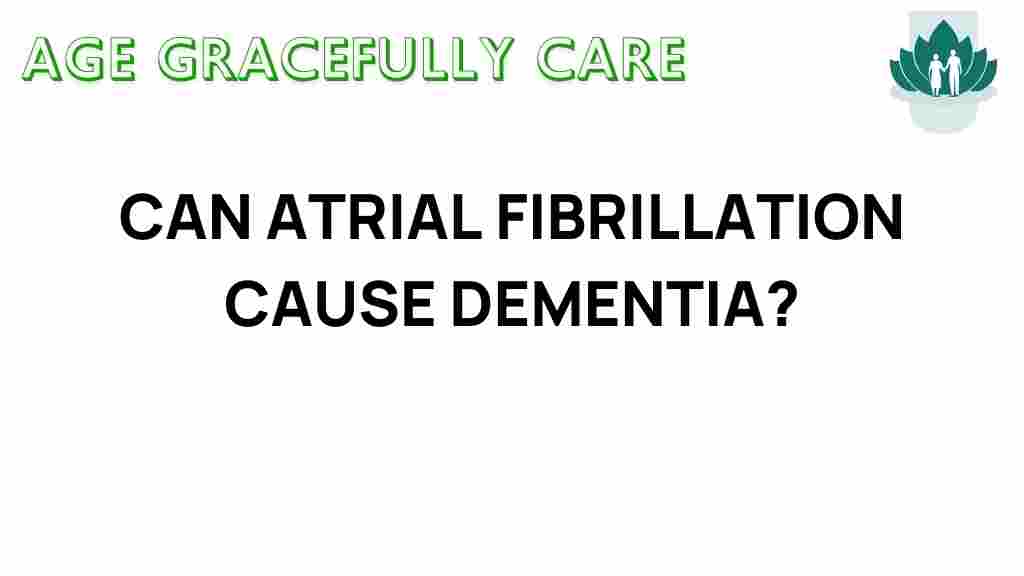Unraveling the Link: Can Atrial Fibrillation Lead to Dementia?
Atrial fibrillation (AFib) is a common heart condition characterized by irregular and often rapid heartbeats. As this condition affects millions of people worldwide, a critical question arises: can atrial fibrillation lead to dementia? This article delves into the intricate relationship between atrial fibrillation, dementia, and heart health, particularly focusing on how AFib may contribute to cognitive decline in the elderly. We will explore the risk factors, the implications for brain function, and the overall impact on cardiovascular health.
Understanding Atrial Fibrillation
Atrial fibrillation is a type of arrhythmia, meaning the heart beats in an abnormal rhythm. Here are some key points to understand about AFib:
- Symptoms: Common symptoms include palpitations, shortness of breath, and fatigue.
- Causes: AFib can be triggered by various factors, including high blood pressure, heart disease, and lifestyle choices.
- Risks: Patients with AFib are at an increased risk of stroke, heart failure, and other cardiovascular complications.
Link Between Atrial Fibrillation and Dementia
Research has increasingly highlighted a potential connection between atrial fibrillation and dementia. Here’s how AFib can influence brain function:
- Stroke Risk: AFib significantly increases the risk of stroke, which can lead to cognitive decline and dementia.
- Reduced Blood Flow: The irregular heart rhythms can result in decreased blood flow to the brain, negatively impacting its function.
- Inflammation: AFib is associated with increased inflammation in the body, which may contribute to neurodegenerative diseases.
Understanding these connections is essential for elderly care, as older adults are particularly vulnerable to both AFib and dementia.
Risk Factors for Atrial Fibrillation and Dementia
Several risk factors contribute to the development of both atrial fibrillation and dementia. Identifying these can help in managing and potentially reducing the risk of cognitive decline:
- Age: The risk of AFib and dementia increases with age.
- Hypertension: High blood pressure is a significant risk factor for both conditions.
- Diabetes: Diabetes can damage blood vessels and increase cardiovascular risks.
- Heart Disease: Pre-existing heart conditions can elevate the likelihood of developing AFib.
- Obesity: Excess weight is linked to both atrial fibrillation and cognitive issues.
- Smoking: Tobacco use is detrimental to cardiovascular and brain health.
Step-by-Step: How Atrial Fibrillation Can Lead to Cognitive Decline
Understanding the process through which AFib may lead to dementia involves several steps:
- Onset of Atrial Fibrillation: The heart begins to beat irregularly, resulting in ineffective pumping.
- Increased Risk of Stroke: Blood clots can form in the heart and travel to the brain, leading to a stroke.
- Stroke and Brain Damage: A stroke may cause immediate brain damage, affecting cognitive functions.
- Chronic Effects: Even without a stroke, chronic AFib can lead to gradual cognitive decline due to reduced blood flow.
Impact on Brain Function
AFib can alter brain health in several ways:
- Reduced Oxygen Supply: Irregular heart rhythms may lead to decreased oxygen supply to the brain.
- Vascular Damage: The condition can cause changes in the blood vessels, affecting their ability to deliver nutrients to the brain.
- Increased Risk of Neurodegeneration: Long-term AFib may contribute to neurodegenerative diseases, accelerating cognitive decline.
Managing Atrial Fibrillation to Protect Cognitive Health
Effective management of atrial fibrillation is crucial for safeguarding brain function and preventing dementia. Here are some strategies:
- Regular Monitoring: Routine check-ups with healthcare providers can help manage AFib effectively.
- Medications: Anticoagulants and other medications may be prescribed to reduce the risk of stroke.
- Lifestyle Changes: Maintaining a healthy lifestyle, including a balanced diet and regular exercise, can improve heart health.
- Managing Comorbidities: Controlling conditions like hypertension and diabetes is vital.
For more detailed information on managing atrial fibrillation, consider visiting this resource.
Troubleshooting Tips for Patients and Caregivers
For patients living with atrial fibrillation and their caregivers, here are some troubleshooting tips:
- Know the Symptoms: Be aware of AFib symptoms and seek medical advice if they worsen.
- Emergency Plan: Have an emergency plan in place in case of a severe AFib episode or stroke.
- Educate Yourself: Stay informed about both AFib and dementia to recognize early signs of cognitive decline.
- Support System: Encourage family and friends to be involved in care to ensure comprehensive support.
Conclusion
As we unravel the link between atrial fibrillation and dementia, it becomes clear that maintaining heart health is paramount for preserving cognitive function, especially in the elderly. Understanding the risk factors, recognizing the potential for cognitive decline, and implementing effective management strategies are essential steps in safeguarding brain health. By taking proactive measures, patients and caregivers can work together to mitigate the risks associated with atrial fibrillation and support overall well-being.
For further reading on related health topics, check out this informative article.
This article is in the category Health and created by AgeGracefullyCare Team
